There’s Only One Way To Improve The GOP Primary Debates, Fewer People On Stage
Several Republican candidates for President want to "fix" the debates, but they wouldn't like the one thing that would definitely fix them.
Politico and several other news outlets are reporting that the campaigns of many of the Republican candidates for President will meet to discuss possible changes to candidate debates going forward in the wake of Wednesday’s widely-panned CNBC debate:
Republican presidential campaigns are planning to gather in Washington, D.C., on Sunday evening to plot how to alter their party’s messy debate process — and how to remove power from the hands of the Republican National Committee.
Not invited to the meeting: Anyone from the RNC, which many candidates have openly criticized in the hours since Wednesday’s CNBC debate in Boulder, Colorado — a chaotic, disorganized affair that was widely panned by political observers.
On Thursday, many of the campaigns told POLITICO that the RNC, which has taken a greater role in the 2016 debate process than in previous election cycles, had failed to take their concerns into account. It was time, top aides to at least half a dozen of the candidates agreed, to begin discussing among themselves how the next debates should be structured and not leave it up to the RNC and television networks.
The gathering is being organized by advisers to the campaigns of Donald Trump, Ben Carson, Bobby Jindal and Lindsey Graham, according to multiple sources involved in the planning. Others who are expected to attend, organizers say, are representatives for Carly Fiorina, Mike Huckabee, Rand Paul, Marco Rubio and Rick Santorum. The planners are also reaching out to other Republican candidates.
Spokespersons for the RNC did not immediately respond to a request for comment.
“I think the campaigns have a number of concerns and they have a right to talk about that amongst themselves,” said Christian Ferry, Graham’s campaign manager. The objective, Ferry said, was to “find out what works best for us as a group.”
Figuring that out could be contentious as each campaign has a number of different complaints about the process. Some — such as Bush and Paul — have griped about unequal speaking time. Others have complained bitterly about how polling is used to determine who qualifies for the prime-time and undercard debates. Some have insisted on giving opening and closing statements, despite the networks’ desire to have the candidates spend as much time as possible clashing with each other on stage.
Jindal, who polls better in Iowa than he does nationally, has argued that criteria for determining who qualifies for debates should be based on early state polling, not just national surveys.
“Our continuous complaint is candidate exclusion and the delusional debate polling criteria. It’s unacceptable,” said Gail Gitcho, a Jindal spokeswoman. “Maybe this meeting will change that, maybe it won’t. But we aren’t going to shut up about it.”
Graham’s campaign has argued that there should be two debates — with two groups of seven or eight candidates selected randomly.
Carson said on Thursday that he had asked his staff to contact other campaigns to propose format changes, without sharing specifically what he thinks those changes should be.
“It’s not about me and gotcha questions. It’s about the American people and whether they have the right to hear what we think,” Carson said before an event at Colorado Christian University. “The whole format was just craziness … You got to be really bad for the whole crowd to boo you.”
As I detailed yesterday, the debate on CNBC is deserving of criticism largely because the moderators simply did an atrocious job of either asking focused questions or simply keeping control of the process sufficiently so that a rational discussion could occur and each candidate could be heard from at least somewhat equally. Beyond that, there has also been criticism that goes beyond just the CNBC debate that many of the questions that have been asked in all three debates so far have focused more on seemingly irrelevant personality issues and efforts to get the candidates to fight among themselves than they have on policy issues and attempting to get the candidates to be more specific about their policy positions and proposals than they generally in stump speeches, in interviews, in their campaign literature, or on their campaign website. As I’ve said, we got some of that from the Fox News and CNN debates, and indeed even a little bit of it from the CNBC debate, but on balance there has been far too much focus on trivial nonsense and efforts by either the candidates or the moment to create a moment that will go viral on the Internet. This is hardly new, of course, and a lot of it is attributable to the fact that there are simply far too many candidates on the stage at the Republican debate to have a meaningful discussion of any issue even inside of a two-and-a-half or three hour time limits that marked the first two debates, both of which were way too long in any case.
It’s hard to know exactly what will come of this meeting on Sunday, in no small part because many of these campaigns have competing interests when it comes to the kind of changes they likely want to see to the process. Those candidates who are being excluded from the main stage debates, or on the verge of not meeting the criteria for inclusion in future debates, are likely most interested in adjusting criteria so that they are no longer marginalized by only getting an invitation to an early debate that gets far lower viewership. The early debate on Wednesday, for example, had less than two million viewers compared to the 14 million who watched the prime time debate, and the differences in viewership have been the same for the previous two debates as well. Other candidates are likely to be mostly concerned with some of the same issues that led several of them to lobby the RNC and CNBC for format changes to Wednesday’s debate that included opening and closing statements, and a strict time limit on the total debate that ensures we won’t see a repeat of the marathon sessions on Fox News Channel in August and CNN in September. CNBC, of course, ended up agreeing to most of those requested changes and yet we still ended up with a disaster of a debate. Finally, even if the campaigns can agree on a common strategy, it’s unclear how they’ll be able to enforce it. The ultimate sanction, of course, would be to refuse to participate in any debate that didn’t abide by their agreed guidelines, but it seems unlikely that candidates running for President are going to give up on the chance for free air time if presented with it.
The best way to increase the quality of these debates, of course, is to make the number of participants smaller. As I’ve said from the beginning of the debate season, ten or more candidates on the stage, even for more than two hours, is not conducive to any kind of useful discussion of the issues and is not going to help voters make any decisions. In no small part, of course, this is simply because the amount of time that any single candidate will have to talk is going to be limited to such an extent that they’ll have little time to do anything other than spout off pre-rehearsed talking points and poll-tested zingers directed either at other candidates or at the moderators. With the debates in the beginning, it would have been admittedly unfair to exclude large numbers of candidates before voters had even had a chance to hear from them, which is the main reason why the RNC and the networks came up with the idea of the “undercard debate” featuring those candidates at the bottom of the polls. Had an effort been made to include all 17 candidates in the early debates, it would have been absurdly unworkable, and at least the undercard debate allowed for some breathing room for candidates and moderators alike.
The further we get in the process, though, the less sense it makes to have either the undercard debate or to have a debate that includes ten people, the vast majority of whom really don’t have a realistic shot of winning the nomination. CNBC seemed to be attempting to do that with it’s criteria that limited main stage participation to candidates who were averaging 2.5% or greater in the polls, and this will be the criteria that Fox Business Network uses for next month debate. As we saw, though, the current state of the GOP race meant that those criteria didn’t have any real impact on who was invited and we still ended up with ten people on the main stage. Given that we are now three months away from the start of the actual primaries, I would suggest that the criteria ought to be tightened up. Any candidate not averaging at least 5% in national polling, or polling in Iowa or New Hampshire, over a given period prior to the debate should not be invited to the main stage debate. If the network holding the debate wants to also have an undercard debate featuring the candidates who didn’t make the cut, that’s their choice, but it’s long past time to stop pretending that the people who can’t even get halfway to ten percent in a poll are going to have even an outside chance of being the nominee. The other alternative, of course, would be to break up the main debate somehow and effectively have two prime time debates, but the problem I see there is that it seems unlikely that networks would be willing to give up that much air time, or that viewers would be willing to sit through it. Additionally, the “two debate” idea sounded better when applied to the early debates in August and September, but it makes much less sense now that we’re getting down to the serious part of the campaign. Of course, since the candidates are unlikely to agree to criteria that make it less likely they’ll get on camera, my idea is probably a non-starter.
Update: James Joyner has further thoughts on possible reforms to the debates going forward.
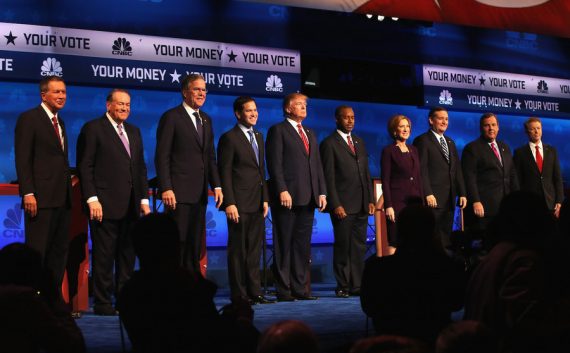

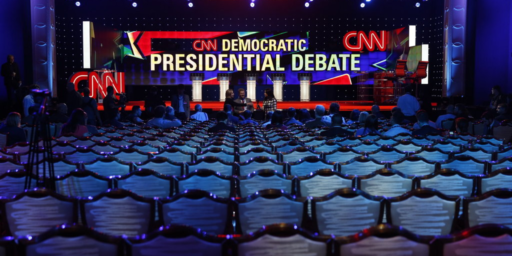
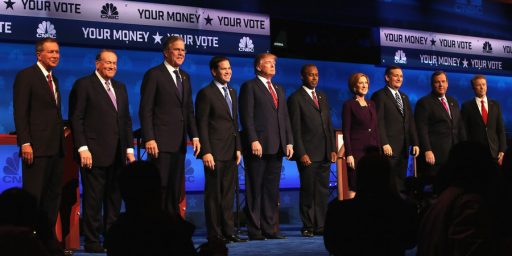
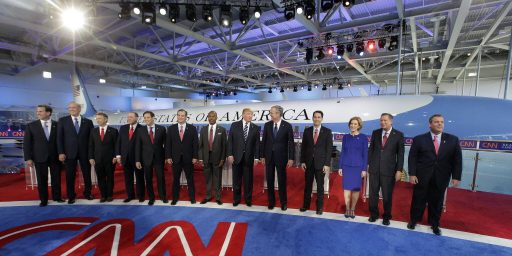
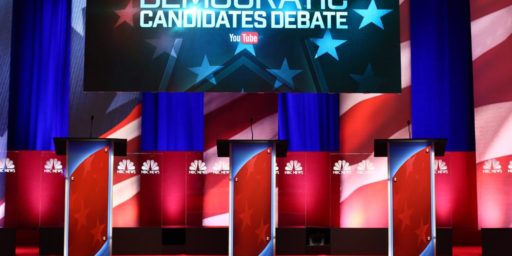
Good commentary Doug
My GOP Debate Improvements:
Fewer participants – Let RNC select up to 6 participants
Moderators – Let RNC select the moderators, reduce some complaints about media bias
Audience – No change, it’s a home field advantage anyway
I wouldn’t really like the idea of the RNC picking who participates, or the DNC on the Democratic side. The criteria do need to be objective under relevant FEC regulations, which is why using polling, while inexact, is probably the best way to do things. Also, the rules that govern both party committees generally require them to stay neutral in primary races, and picking who gets into debates is certainly not neutral.
As for the moderators, my understanding is that the RNC has worked with the networks on that. I don’t know if that means they have veto power or not, but I would assume that if there were strong objections about someone they would not be on the panel.
The only thing that will improve those GOP debates is better candidates.
None of these people has any business running for the highest office in the land.
They have no grasp of facts, or even of reality.
If this is the best the Republicans have to offer…time to stop offering.
Agree completely. Frankly, the TV networks should just say: “Based on our research, we can’t have a good debate experience with more than 5 debate participants onstage. So in future we’re just going to invite the top 5 in the polls to the main debate. We’ll have a junior debate for all those who polled more than 5 per cent but didn’t make it to the top 5. The rest, thanks for participating in the democratic process by running.We’ll continue to cover you when and if you make news. ”
That would be brutally honest, but it’s time to recognize current political reality.
Unintended irony.
@al-Ameda:
The Republican candidates will always want to use “media bias” as their fallback when moderators ask them a question they don’t like. I expect them to use that regardless of whom the moderators are.
For folks like Ben Carson, they are going to claim bias if the questions are going to be anything tougher than “Which do you like better, kittens or puppies?”
Listen, the candidates don’t want debates nor do they want substantive discussions. And they certainly don’t want hard questions. What they apparently want, without explicitly saying so, is to give 10 minutes speeches full of vacuous talking points.
So why don’t they get on stage, have their 10 minutes, and call it a night. Order can be random, pulled out of a hat.
My suggestion is eliminate the debates all together. They have become little more than a reality TV show farce.
@Doug Mataconis:
I mostly agree. But there’s a feeling you and James hope to see the Republican Party reform itself. I don’t see that happening unless the Party finds some way to influence candidate selection. Maybe there’s a germ of an idea here.
I believe the NH Sec of State has said that Sanders says he isn’t a Dem, so he can’t be on the Dem primary ballot. The DNC has sent a letter saying Bernie is a Dem. Apparently that’s sufficient. (And an indication of how unfraid they are of Bernie’s challenge.) Maybe the RNC should explore the legal ramifications of sending a letter to the various Secs O’ State that Trump is not a Republican and cannot appear on their ballot. Politically impossible for them at this late date, but a principle to explore?
3 90 minute debates, on consecutive days, with the particicipants drawn by lot from among the candidates with more than 1%. Tuesday through Thursday.
It eliminates the undercard status, gives everyone more time and lets each grouping have a newscycle without being overshadowed, so the currently less popular candidates get a chance to shine.
Keep moderation the way it is, because nothing helps a Republican candidate shine like complaining about the liberal media.
That, of course, assumes you want to use the debates as a platform to introduce candidates to the voters. If you want to lock in the crazy top-tier, go with the top 5, and send the rest of them to the kiddie table debate (which could be moderated by interns)
@Gustopher:
That would be a good idea for the first 2-3 debates. That’s enough of an introduction, though. After that, we should focus on those whom the public have indicated that they actually want to hear from.
Hey, the people have spoken . Apparently, there are a lot of Republicans who do think that Trump, Carson, and Cruz are rational Presidential nominee choices. Let’s take the time to discuss and analyze their policy ideas. (It’s hard to type that sentence without laughing, but still…).
How about several rounds of a quiz show format like Jeopardy, which will test the candidates on facts and reality on issues such as the debt, deficit, world events/leaders, history, etc. The top three who get the highest scores get to a main debate stage.
That way we’ve not only effectively winnowed the field, we’ve also identified which candidates actually know what they are talking about. And it’d be entertaining.
@Gustopher: 90 minutes per debate is too long. Voters don’t have patience for it, even if they agree with the people onstage. If I’m the candidate pool — especially in the lower end — I push for online “debates” no longer than an hour. Here’s how I would set it up:
– Partition candidates into 3 debating groups of 4, with at least one top-4 candidate per group.
– 60 minutes total per debate, 2 minutes opening and closing remarks per candidate (16 minutes total).
– Allow submission of questions from any venue (public or news).
– Each “debate” has a list of 4 potential moderators; participating candidates pick their top 2. If no consensus is reached on one of the moderators, someone else selects (RNC, coin flip, Siri…whatever)
– Moderators cull question submissions to 8 “key” questions, all of which should be policy-based, all of which are provided to candidates beforehand. None of this “Two weeks ago, your opponent said that you didn’t wash your hands after peeing. What do you think of that?”
– Moderators ask questions in whatever order they choose and get to however many they get to.
– Each candidate gets 1 minute to present his/her policy position on a question (that’s 4 minutes minimum); debate then ensues for up to 10 more minutes on any question, with no candidate getting more than 1 minute at a time to talk. This allows for some expansion of ideas and verbal sparring.
– Moderators may do limited follow-ups but are generally there to keep candidates on topic and on time.
– Debates are M-W-F, then occur again 2 weeks later with new groupings.
Each of the 4 people on-stage will get 10-20 minutes of airtime in a relatively personal forum. They each get to outline a couple policy proposals or positions as well as show their personalities far better than they can in stump speeches. This also keeps the Republican party in the news for the extended period, in a nearly endless pre-debate speculation/post-debate deconstruction mode.
There are any number of objective criteria for selecting debate participants.
– Age / Weight / Height
– Number of Y-chromosomes
– Years of public service
– Total electoral votes of home state
– Fundraising totals
– Number of campaign workers
– Vowels in middle name
– NRA score
The polling numbers become a self-fullfilling prophesy when they’re used to limit debate appearances which is why some organizations stopped releasing polling numbers earlier in the cycle when it became clear that the results were being reified.
Basically just pick who you want to be in the debate and reverse engineer an objective criteria that results in the correct match. That’s essentially what they did to allow Fiorina into the previous debate by changing the formula of polls.
Top 10 polling candidates engage in 1 on 1 debates using a round robin format. I’m not volunteering to watch, just suggesting it in case we need a new enhanced interrogation option.